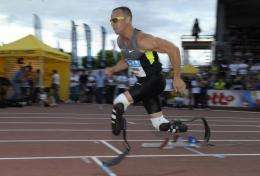3Qs: The fastest man on no legs

South African double-amputee Oscar Pistorius will compete in the 400-meter sprint at the 2012 London Olympics wearing high-tech carbon-fiber prosthetic legs. Northeastern University news office asked David Nolan, an associate clinical professor of physical therapy in the Bouvé College of Health Sciences, to expound upon the controversy over whether Pistorius’ pair of artificial legs would give him an unfair advantage over the field.
Who is Oscar Pistorius and why are people talking about him?
Oscar Pistorius is a bilateral, transtibial — or below the knee — amputee. He was born without a fibula in both legs, and his parents made the decision to amputate. Kids who are born without a limb or have a procedure done when they’re very young often have an easier time dealing with their disability than if they have a limb amputated years down the road. Pistorius was always very motivated to succeed and wanted to be a regular kid, playing rugby and, of course, running.
The controversy over his participation in the Olympics centers on the carbon-fiber prosthetic legs that he uses to run. When the carbon-fiber legs hit the ground, they compress, which produces an energy return. The people who are not in favor of Oscar competing with well-bodied folks say that this gives him an unfair advantage.
From your perspective, does he really have an unfair advantage?
Some studies that have examined energy expenditure in amputees have found that they have to make up for the force that would be produced by, say, a leg, by expending energy using another part of their body. I would fall short of saying that Oscar, by being a bilateral amputee, has an unfair advantage. Cardiovascular performance studies indicate that he’s at or above the level of many people, which tells me that he’s very well trained, very motivated. The argument that he has made in defense of his making the Olympics is that many unilateral and bilateral amputees who use carbon-fiber blades to run are not all breaking records. If the devices made the runner, then you’d have hundreds of Oscars competing at the highest level.
What does this fit into the bigger picture?
The Court of Arbitration for Sport’s decision to allow Oscar to compete in the Olympics essentially allows anyone with any disability with any adaptive equipment the opportunity to claim that he or she should be allowed to compete. The question is, where do we draw the line and say, “Sorry you need to be in the Paralympics or the Special Olympics”?
We live in a society that prides itself on fairness. We have laws that offer the same opportunities for male and female athletes and we expect that in our communities there is also fairness in the workplace for any person with mental or physical challenges. The same should be true for sport. We should advocate for fairness. Allowing Oscar and other athletes that have the ability to qualify to compete with able-bodied athletes is fair.




















